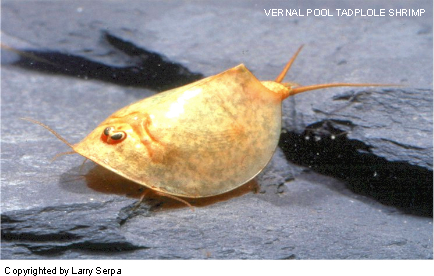|
| 질의: Triops longicaudatus | 결과: 10번째/10 | |
Vernal Pool Tadpole Shrimp (Lepidurus packardi) species account
| 제목: | Vernal Pool Tadpole Shrimp (Lepidurus packardi) species account
| | 올린이: | funny monster (from@fws.gov)
| |

| 해상도: 434x276
파일크기: 139964 Bytes
등록시간: 2007:09:11 19:25:22
|
Sacramento Fish & Wildlife Office
Species Account
VERNAL POOL TADPOLE SHRIMP
(Lepidurus packardi)
[Photo] Vernal pool tadpole shrimp, Lepidurus packardi. Photo Credit: ??Larry Serpa
CLASSIFICATION: Federal Endangered Species (Federal Register 59-48136; September 19, 1994)
CRITICAL HABITAT: Originally designated in Federal Register 68:46683 pdf; August 6, 2003.
The designation was revised in 70:46923 pdf; August 11, 2005. Species by unit designations were published in 71:7117 (pdf) February 10, 2006.
RECOVERY PLAN: Recovery Plan for Vernal Pool Ecosystems of California and Southern Oregon
DESCRIPTION:
The vernal pool tadpole shrimp (Lepidurus packardi) is a small crustacean in the Triopsidae family. It has compound eyes, a large shield-like carapace (shell) that covers most of the body, and a pair of long cercopods (appendages) at the end of the last abdominal segment. Vernal pool tadpole shrimp adults reach a length of 2 inches in length. They have about 35 pairs of legs and two long cercopods. This species superficially resembles the rice field tadpole shrimp (Triops longicaudatus).
Tadpole shrimp climb or scramble over objects, as well as plowing along or within bottom sediments. Their diet consists of organic debris and living organisms, such as fairy shrimp and other invertebrates. This animal inhabits vernal pools containing clear to highly turbid water, ranging in size from 54 square feet in the former Mather Air Force Base area of Sacramento County, to the 89-acre Olcott Lake at Jepson Prairie.
The life history of the vernal pool tadpole shrimp is linked to the seasonal cycle of the vernal pool. After winter rainwater fills the pool, the population is reestablished from cysts that lie dormant in the dry pool sediments. Sexually mature adults have been observed in vernal pools three to four weeks after the pools had been filled. Some cysts hatch immediately and the others remain dormant in the soil to hatch during later rainy seasons.
DISTRIBUTION:
The vernal pool tadpole shrimp is currently distributed across the Central Valley of California and in the San Francisco Bay area.
THREATS:
Seventeen occurrences of vernal pool tadpole shrimp are threatened by development. An additional 16 occurrences are threatened by various agricultural conversions.
The species is threatened by the encroachment of nonnative annual grasses on the San Francisco Bay National Wildlife Refuge in the Central Coast region, and by urban development where it is known to occur on private land in Alameda County. In the Northeastern Sacramento Valley region, most of the known occurrences are on Caltrans rights of way where they continue to be threatened by road improvement projects related to general urban growth.
In addition, the species is known to have been parasitized by flukes (Trematoda) of an undetermined species at the Vina Plains, Tehama County (Ahl 1991).
...
Source: http://www.fws.gov/sacramento/es/animal_spp_acct/vp_tadpole.htm
|
댓글 |
|---|
| | 손님 |
|
| that is so cool!!! |
| | 손님 |
|
| So cute~~ |
| | 손님 |
|
| delicious! |
| | 동물애호가 |
|
골든 투구새우인가?
정말 끝내주는군
good! |
| | 손님 |
|
| that is like some kind of creature or beast |
 |

|

|
Triops longicaudatus
10/10 |
 |
 |
^o^
동물그림창고 똑똑전화 누리집
^o^
|
|
|